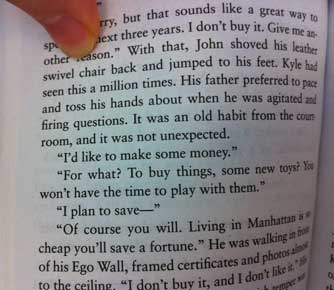: Tangled
I am delighted to report that this is a terrific film. It’s not perfect, but it’s definitely one of Disney’s best in a long time. The best thing about it is the psychological behaviors of the characters are real, not cardboard mockups like in most Disney cartoons. For instance, Rapunzal’s character loves the woman she thinks is her mother (she doesn’t realize she was kidnapped as a child by the woman) and is in conflict with herself over obeying her mother and staying in the tower, or leaving and exploring the world she longs to experience. This conflict isn’t just stated, but shown multiple times throughout the film. For a cartoon, it’s amazingly realistically presented, and of course when Rapunzal finally figures things out at the end and stands up for herself, it’s a powerful and emotional moment because of all that buildup. In terms of plot, I had expected that this would be an “alternative” telling of the Rapunzal tale, but it seemed to follow a fairly traditional story. That’s a good thing, for why mess with a classic? (Last year’s The Princess and the Frog took a ton of liberties with the original story and it wasn’t always an improvement.) The animation and filmwork is awesome (the 3D is pretty good, too, though not a must). However, I have a beef with some of the physics. How can a horse and man fall of a cliff and just get up unhurt? Some of Rapunzal’s violence to the man should have caused brain injuries (she keeps hitting him with a frying pan) and yet he seems no worse for the wear. Odd, in a film that is otherwise well-done and grounded in genuine human behavior (it’s not like a regular cartoon where you’d expect such unreality). Another weak point is the music. From the trailers you wouldn’t know this was a musical, but it is, unfortunately. While the songs are okay and blend in fairly well with the story, they poke one of my pet peeves about musicals in that the lyrics to the songs are basically just people singing what they want to tell us. For instance, if I was in a musical right now I’d be singing, “I’m writing movie commentary for my blog, criticizing the way musicals sing what should be said.” I find that annoying and dumb: songs are poetry which are supposed to be metaphorical and give us insight into the characters and situation, not just tell us story. Fortunately, there aren’t that many songs, and some are quite fun. (I liked the “Mama Knows Best” one the witch sings, and the “Everybody Has Dreams” one sung by all the cutthroats in the pub, which also had the best choreography and humor.) Another really smart feature is the way the way the script handles the animal sidekicks. Instead of having our main characters do low-brow humor, which demeans and simplifies them, the humor is mostly the left to the animal sidekicks (a horse and a chameleon). These animals can’t speak, which is refreshing, as they must reveal their thoughts with exaggerated facial expressions and gestures. The result is hilarity and warmth. (Some of the best scenes are the conflict between the thief hero and the out-to-arrest-him police horse.) Overall, this is a wonderful story. It’s rich enough in character that adults can get a lot out of it, and yet there’s plenty of action and humor for kids. One thing I really liked is that the story isn’t dumbed down for children — there’s a stabbing with real blood and consequences, as well as another key death — but such delicate things are cleverly handled in a way that’s not going to be traumatic for kids. The bottom line is this is one of the best animated films I’ve seen in a long time. It’s perhaps not quite up to Pixar’s impossibly high standards, but it’s loads better than even above average fair such as Despicable Me and Megamind. Definitely put this on your must-see list.
Topic: [/movie] |
 [Click to enlarge]
[Click to enlarge]



